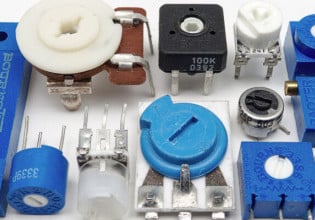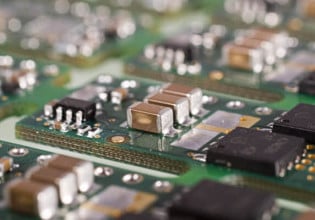Raytheon Achieves UK First with Opening of New Silicon-Carbide Foundry
Raytheon officially 'opened for business' a new UK-leading silicon-carbide (SiC) manufacturing 'foundry' facility, developed through several years' research into advanced manufacturing processes and materials science. The application of SiC in electronic systems will place the UK in a leading position to develop next-generation high-efficiency, smaller, low-weight power conversion products used in harsh environments across the automotive, aerospace, geothermal explorations, oil and gas, and clean energy sectors.
The Secretary of State for Scotland, the Rt. Hon. Michael Moore, who opened the foundry, said: "Today marks an important demonstration of what we can achieve in the UK through collaboration. The silicon carbide foundry is the first of its kind in the UK and represents the fusion of Raytheon's investment in UK manufacturing technology with university expertise, backed by UK Government funding from the Technology Strategy Board. This scientific and engineering endeavor born out of Raytheon Glenrothes has placed Scotland in a unique leadership position globally, enhanced by universities across the UK. The investment has created a team of world-class engineering specialists working in the production of silicon carbide devices and systems designed to operate at high temperatures, specialists who will continue to shape and influence advanced manufacturing processes and technologies."
Raytheon's ability to process SiC utilizes high-temperature annealing and high-temperature/high-voltage ion implantation. The components provide unique properties in electronics: SiC has the ability to operate at higher voltages and greater temperatures than pure silicon, and at a third of the weight and volume -- improving operational performance and reducing system operating costs. Raytheon is the first company to have successfully tested SiC circuit devices at temperatures up to 400 degrees Celsius.
Bob Delorge, chief executive, Raytheon UK, said: "Raytheon's investment in the foundry coupled with support from the Technology Strategy Board exceeds £3.5 million to date. This places the company at the start of a journey to exploit new global markets for this cost-efficient material, which is estimated to bring significant new business to Raytheon in Scotland in the coming years. As well as employing industry-leading engineers and scientists, we have made substantial commitments to develop new engineering talent to maintain our technological edge in high temperature silicon carbide. We are supporting PhD students and undergraduates, and we are giving apprentices and young graduates the opportunity to develop their careers in this new and exciting arena of next-generation semiconductor technology.
"What was previously unachievable is now possible with silicon carbide," he added, "as it allows for smaller and lighter electronics to operate in harsh environments, and addresses a real customer need for significant energy efficiency savings in the manufacture of power switching and rectifying components (ac-dc converters)."
Ian Watson, director of the aerospace, defence, security and space trade organisation, ADS Scotland, said: "Today we see Raytheon UK gearing up for future success -- through investment, collaboration and diversification. At ADS, we know one of the main challenges industry faces as it looks to the future is continuing technological discovery to stay ahead of global competition. To address this challenge, it is vital that industry and academia work together to advance technology and fully explore commercial applications. Raytheon's new facility at Glenrothes is a brilliant example of this and shows the company to be confident not only about its own future, but also the future of the United Kingdom as a home to market leading innovation.
"This sector with companies such as Raytheon that operate in Scotland contributes billions in sales, millions in R&D and thousands in jobs. It demonstrates exactly why aerospace and defence are at the heart of the economy and why their success is crucial to our overall future economic prospects."






